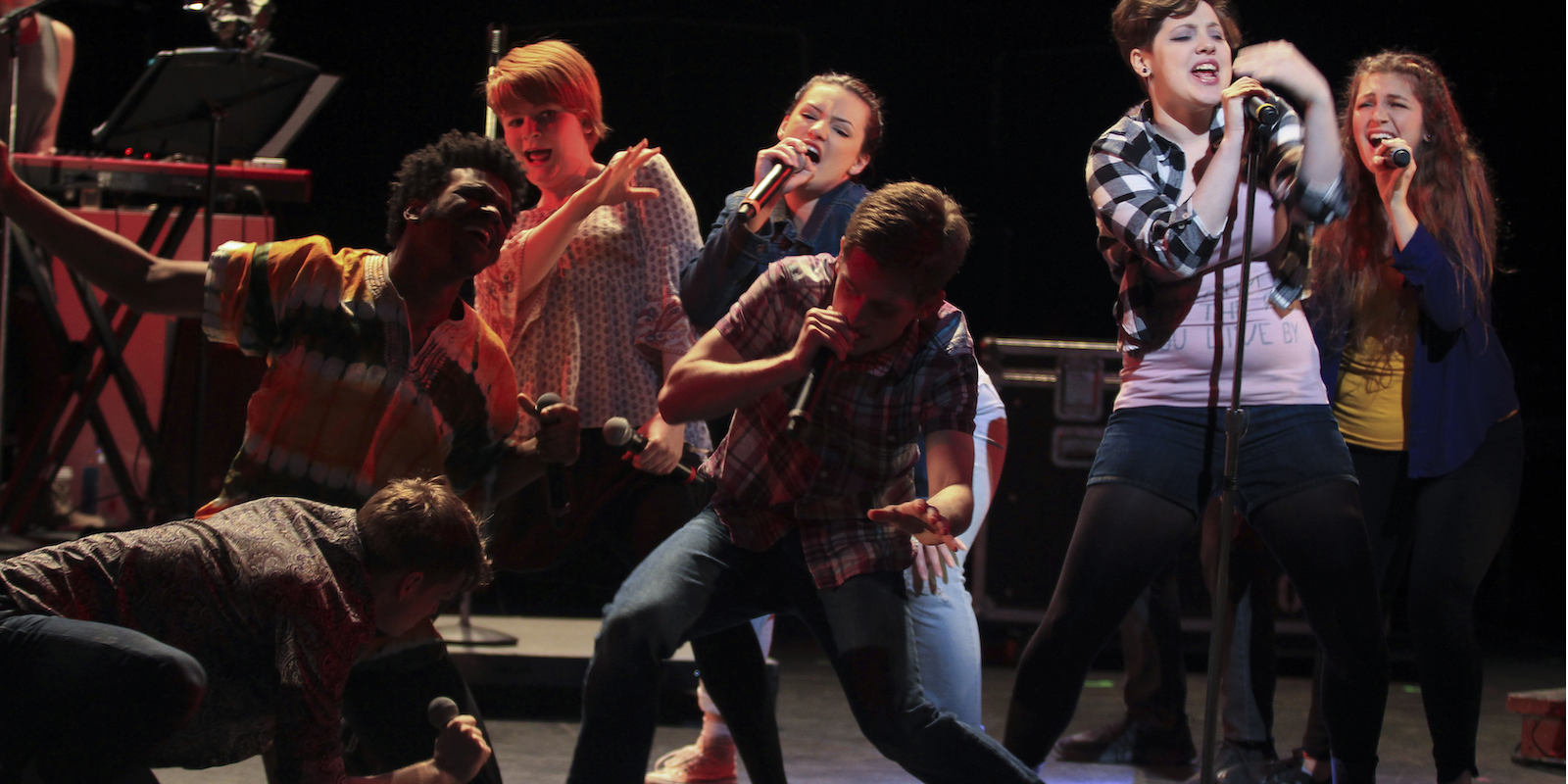
Katie Donovan, Program Director
kadonovan@uarts.edu
215-717-6455
C O N T E N T S
Description
The four-year Bachelor of Fine Arts Musical Theater Program prepares students as artists in the musical theater or for continued study in graduate school. The program defines “musical theater” in a way that embraces the richness and diversity of this evolving, challenging interdisciplinary art form that includes new and alternative forms of musical theater, musical comedy, the musical play in the Hammerstein-Sondheim tradition, “Broadway opera,” cabaret, and revue. Students receive the same acting technique training as acting majors in their first five semesters. This training is complemented by training in vocal technique, musicianship, dance, movement, musical theater performance techniques, and study of the repertoire of the musical theater in print, recordings, rehearsal, and performance.
Actor training lies at the curricular heart of the two performance majors in the School of Theater Arts. The Freshman year revolves around 6 hours of acting studio weekly in which the student is introduced to the basics of behavior and acting through improvisation and the techniques outlined by Uta Hagen in “Respect for Acting” developing the students’ capacity to “live truthfully under imaginary circumstances” through sensory exploration and object exercises (“re-creating behavior which leads to the achievement of a simple objective.”). Improvisation is used as a technique to develop the students’ capacity to listen and respond, develop their imaginations, and live in the moment. In the spring, the acting studio embarks on the “Explorer Project” which, leaning on the fall training in improvisation devising and scene study, involves the preparation of a full act of a contemporary play for an audience. The Musical Theater major also explores and trains the actor’s response to musical literature in foundational classes in the Musical Theater Performance (MTP) studio, individual voice lessons, and weekly vocal coaching. Dance, music and keyboard skills, and Survey of Theater and Script Analysis classes also support the Acting and MTP studios.
The Sophomore year again involves 6 hours of acting studio in which the student is introduced to the Stanislavski approach to acting. The work and writings of Konstantin Stanislavski are the bedrock of the majority of contemporary psychological and text based acting techniques. Working through action, imagination, units, objective, and super-objective, the student is given the tools to analyze, break down, and interpret text and character in a productive and reliable way. This technique is applied to scene work from twentieth century American playwrights. The Musical Theater major continues to advance in the MTP studio exploring the anatomy of the song and singer, language and diction for the singer, voice studio, vocal coaching, music skills, and dance and theater history classes.
The Junior year continues with focus on the Stanislavski technique in the fall semester as applied to the masters of poetic realism such as O’Neill, Williams, Miller, and Ibsen. The Musical Theater Major engages in advanced training in the MTP studio exploring acting technique through song and scenes, vocal pedagogy, and musical styles along with dance repertory classes that support the work of the MTP studios. Students continue training in the voice studios and vocal coaching with more challenging and varied repertoire.
The Senior year engages the Musical Theater major in preparation for their pursuit as an artist and entrance into the theatrical community. MTP Professional Preparation, Business of Theater, and Dance Audition classes as well as continued training in the voice and MTP Cabaret studios help the student identify and prepare for that engagement. The senior year is largely elective in design so the student can choose from a range of options. These might include Acting for the Camera, Contemporary Scene Study, Verse Drama Acting Studio, New Musical Studios, Pop/Rock Vocal Styles, advanced dance and movement techniques, playwright based studios (Brecht, Beckett, Chekhov, etc.), the creation of devised work, physical theater, Improvisation, Commedia dell’arte, Mask, Stage Combat, and so on. There is also opportunity for independent studies and internships.
Program Objectives
In addition to the Learning Outcomes of the School of Theater Arts, Ira Brind, Musical Theater graduates will be able to:
- Effectively analyze scene and play structure, identify dramatic conflict and shape specific choices of objective, obstacle, and tactic that serve both the needs of the script and the artist’s imaginative impulse.
- Effectively analyze song structure and content to shape choices that reveal musical and textual demands and their own imaginative impulses, with a dynamic, healthy and expressive singing voice.
- Read and learn music independently, with an understanding of pitch, rhythm, and musical form, and with adequate keyboard skill to play solo lines and simple accompaniments.
- Dance with a proficient technical foundation in ballet, jazz, tap and partnering, and possess the ability to learn steps quickly and execute choreography in major musical theater styles.
Program Requirements (120 credits)